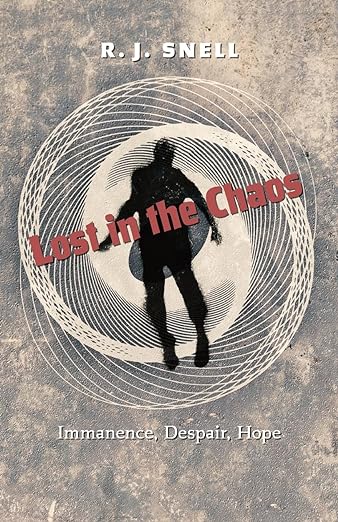The Acton Institute’s Religion & Liberty Online asked me to review a new book by the Catholic thinker R. J. Snell entitled Lost in the Chaos: Immanence, Despair, and Hope. It’s a devastating critique of secularism. As such, it makes an important contribution to contemporary Christian apologetics.
I’ll give you a sample of my introduction to the review to get you started, then tell you a little about what follows. Please hit the link and read the whole thing. From Hope in a Time of Secular Despair:
“Humans are not well-suited to radical immanence.” After all, those who believe only in what they can see are still made in the image of God and possess a supernatural purpose even when they reject any kind of transcendent reality. But such a disconnect creates anxiety and malaise. As a result, substitutes for transcendence are pursued, which only make things worse. So says R.J. Snell in his new book, Lost in the Chaos: Immanence, Despair, Hope, a penetrating analysis of contemporary secularism.
Snell is building on the work of the Canadian philosopher Charles Taylor, whose book A Secular Age argues that humans tend to think and perceive things through a “frame,” which, like a picture frame, limits what they can accept and imagine. Today, people tend to operate within what Taylor calls an “immanent frame” that fixates on the tangible and the immediately perceivable. There was a time, however, when people had a “transcendent frame,” through which everyone discerned a reality beyond the tangible and that gave the tangible meaning. The physical world was “enchanted,” that is to say, to one degree or another, it was “porous” to the supernatural, to gods or to God. . . .
If the universe isn’t “porous” to the transcendent, human beings aren’t either. We become the source of meaning, but that meaning is pretty much pointless, having no relationship to the outside world, which is also pointless. The result is what Taylor calls the “buffered self” in which we are self-enclosed, separated from others and the world, and autonomous. Today postmodernism has finished off any sense of transcendence. As Snell says, “Postmodernism and its progenitors critiqued and deconstructed any and every claim of order, harmony, or rationality as nothing more than projections of power and force.”
This allows for no hope of any kind. Life itself is no longer necessarily considered a good thing. Along with the decline in the number of marriages to the lowest level in history is the rejection of parenthood. Children have always been the sign of hope, Snell says. But today many young adults are getting sterilized on the grounds that it is immoral to bring children into this world. Coupled with the acceptance of abortion, the conclusion is that “it is not good to be, not worth giving life to another.”
In this hopeless climate, Snell says, people who think this way are pursuing one of three options: “frenzied activism” that consists only of negation, critiquing and deconstructing the status quo without offering any alternative; “fever dreams of rationalism,” trying to impose some political ideology, whether of the right or the left, that ignores human limits and so is impossible to implement; or “projects of re-enchantment,” trying to bring back elements of the transcendent universe through fantasy, neopaganism, cosplay, or political make-believe, without surrendering our “buffered selves” as actual religion would require.
He then says what could bring back hope in today’s climate. In a word, that would be Catholicism. See how I push back against that, showing how what he says applies to Protestantism as well.
But I do like his conclusion. He thinks Christianity may well come back. “There is very little reason [for the church] to accommodate and bend ourselves to the whims of the modern world, now that the world loathes and detests itself almost completely.”
The false visions of progress, science, political ideologies, utopias, and exclusive humanism are exposed and unmasked. Ours is a hopeless age and thus an age of great opportunity for the Gospel. From a human point of view things seem bleak for the Church and the Faith; from a supernatural point of view ours is a time of remarkable clarity. Idols are known to be idols, so perhaps we might try proclaiming the one true God.
Again, read my review in its entirety. And then read the book.














